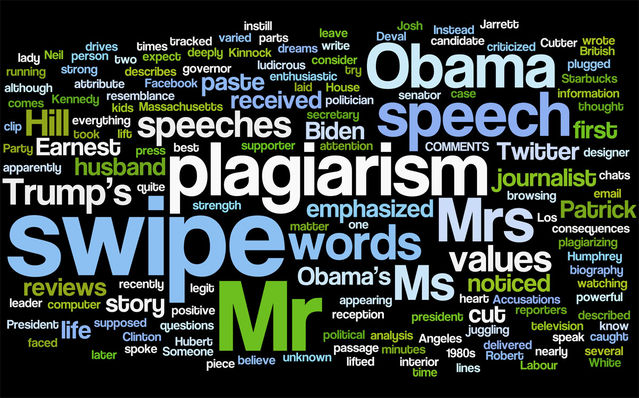Ethics and Morality
Plagiarism and Google
Those who "become one with the cloud" can lose sight of ethics.
Posted July 19, 2016

Melania Trump is the latest of a long string of public figures accused of cribbing words from other people. That raises the question: Is there really an epidemic of celebrity plagiarism, or does it just seem that way?
Last night Jarrett Hill, an unemployed TV journalist, was in a Los Angeles Starbucks with his laptop. He noticed that Melania Trump's words at the Republican National Convention sounded familiar. He was quickly able to pull up a clip of Michelle Obama's convention speech from 2008, compare it to Trump's, and tweet about the similarity. Before broadband, that probably wouldn't have happened. The similarity might have been shrugged off; it wouldn't have been worth the trouble to check out. Clearly the Internet makes it easier to detect copying, and to shame the perpetrators.
So why do people who ought to know better do it? In my book Head in the Cloud I describe a remarkable experiment by Harvard psychologists Daniel Wegner and Adrian F. Ward. They gave a trivia quiz to two groups of volunteers. One group was told they could look up the answers on the Internet; for the other group this wasn't allowed. Afterward both groups filled out questions rating their knowledge, memory, and intelligence.
There was a clear connection between these self-ratings and performance on the quiz. Those who scored better on the quiz rated themselves highly for knowledge and cognitive skills. That's as you'd expect.
Less expected was that the people who'd looked up the answers rated their cognitive skills higher than those who had relied on their own knowledge. The questionnaire had people agree or disagree with statements like "I am smart." On average, the group that looked up the answers felt smarter.
As Ward, now at the University of Texas, puts it, people "become one with the cloud… [they] lose sight of where their own minds end and the mind of the Internet begins."
On the one hand, becoming one with the cloud has nothing to do with the ethics of stealing intellectual property. On the other hand, it has everything to do with it. We all tend to live our lives on autopilot, like a self-driving car, doing what seems proper at the time. It's only after a disaster that we invent ethical justifications. It's dumb to steal from the cloud, but the science says it can make people feel smart—and that may be one reason why it's happening.


